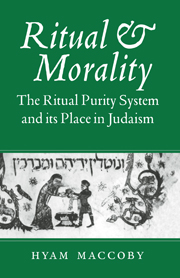Book contents
- Frontmatter
- Contents
- Preface
- Acknowledgments
- List of abbreviations
- 1 The sources of impurity: the human corpse
- 2 The corpse in the tent: an excursus
- 3 The sources of impurity: menstruation
- 4 The sources of impurity: childbirth: the zabah and zab
- 5 Normal emission of semen
- 6 Animals and purity
- 7 Impurity and sacrifices
- 8 The Red Cow: the paradoxes
- 9 The Red Cow and niddah
- 10 Leprosy
- 11 The purification of the leper
- 12 Corpse and leper: an excursus
- 13 Ritual purity in the New Testament
- 14 Milgrom on purity in the Bible
- 15 From demons to ethics
- 16 Ritual purity and morality
- Appendix A The haberim
- Appendix B The rabbinic system of grades of impurity
- References
- Index of quotations
- General index
Appendix B - The rabbinic system of grades of impurity
Published online by Cambridge University Press: 24 November 2009
- Frontmatter
- Contents
- Preface
- Acknowledgments
- List of abbreviations
- 1 The sources of impurity: the human corpse
- 2 The corpse in the tent: an excursus
- 3 The sources of impurity: menstruation
- 4 The sources of impurity: childbirth: the zabah and zab
- 5 Normal emission of semen
- 6 Animals and purity
- 7 Impurity and sacrifices
- 8 The Red Cow: the paradoxes
- 9 The Red Cow and niddah
- 10 Leprosy
- 11 The purification of the leper
- 12 Corpse and leper: an excursus
- 13 Ritual purity in the New Testament
- 14 Milgrom on purity in the Bible
- 15 From demons to ethics
- 16 Ritual purity and morality
- Appendix A The haberim
- Appendix B The rabbinic system of grades of impurity
- References
- Index of quotations
- General index
Summary
The highest degree of impurity is ‘Father of fathers of impurity’ (‘abi abotha-tum'ah). This is the corpse.
Whatever receives impurity from this is called ‘Father of impurity’ (‘ab ha-tum'ah). Other ‘Fathers of impurity’ are not derived from the corpse: e.g. ‘leper’, zab> etc. A Father of impurity derived from a corpse is exceptional, however, in that persons or vessels receiving impurity from it become themselves Fathers of impurity, instead of moving one grade down.
Whatever receives impurity from a Father of impurity is a derivative impurity (vlad ha-tum'ah) and is called ‘first-grade impurity’ (rish'on le-tum'ah). This is also sometimes called tehilah (‘first’).
What receives impurity from a ‘first-grade impurity’ is a ‘second-grade impurity’ (sheni le-tum'ah).
A ‘second-grade impurity’ does not cause impurity to ordinary food (hullin), but only to priestly food (terumah) and sacrificial food (qodashim), which receive from it a ‘third-grade impurity’ (shelishi le-tum'ah).
A ‘third-grade impurity’ causes impurity only to sacrificial food, which receives a ‘fourth-grade impurity’ (rebiy'iy le-tum'ah).
A ‘fourth-grade impurity’ does not cause impurity to anything.
All impurities, from ‘first-grade impurities’ downwards are called ‘derivative impurities’ (vladot ha-tum'ah).
Derivative impurities differ from ‘fathers of impurities’ in that the latter cause impurity to persons and vessels, while the former cause impurity to food and drink, but not to persons or vessels.
The above summary (adapted from the Entziqlopedia Talmudit) is an outline of the system of transmission of impurity, but is much simplified. In general, the rabbinic system is a schematization of data derived from Scripture, but complications having only rabbinic authority were added.
- Type
- Chapter
- Information
- Ritual and MoralityThe Ritual Purity System and its Place in Judaism, pp. 214 - 215Publisher: Cambridge University PressPrint publication year: 1999



